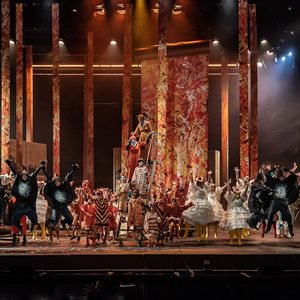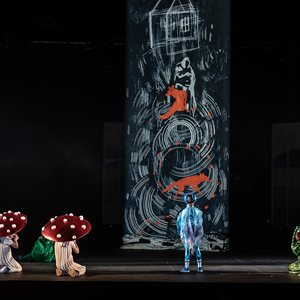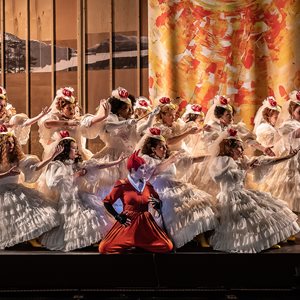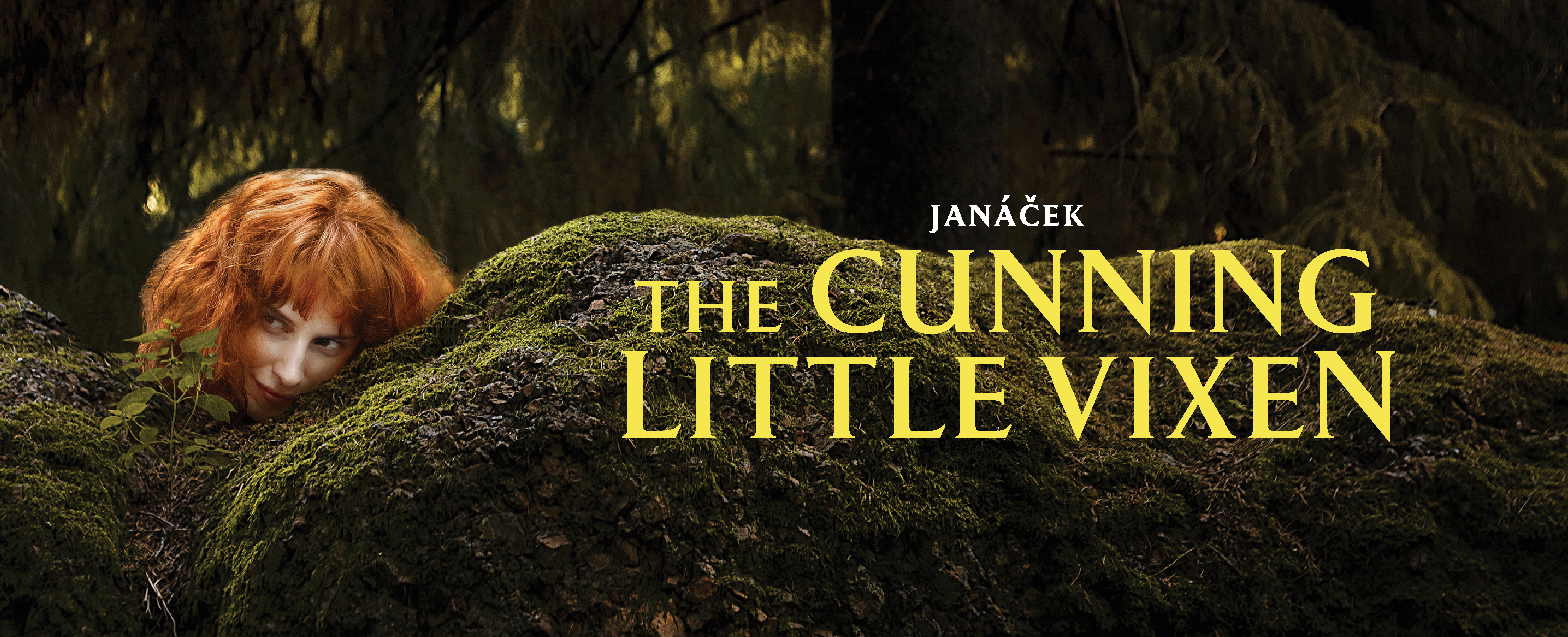The Cunning Little Vixen
Leoš JanáčekJANUARY 26 AND 28, FEBRUARY 3, 8, 10, 14, AND 16, 2024
Four Seasons Centre for the Performing Arts
Performance time is approximately two hours, including one 25-minute intermission
Enjoy our one-night-only Relaxed Performance.
HOUSE PROGRAM
Please note: The Cunning Little Vixen contains scenes with atmospheric effects, bright lights, pyrotechnics, and strobe-like effects.
When a forest gamekeeper traps a fox and attempts to domesticate her, their encounter leads to a poignant reflection on the natural cycle of life and death, as well as our relationship with the planet. This inspiring opera invites audiences to reflect on the advancing toll of climate change and the importance of cultivating a harmonious interrelationship with the natural world.
Canadian soprano and COC favourite Jane Archibald stars as the clever fox, Sharp Ears, while COC Music Director Johannes Debus leads the COC Orchestra through Czech composer Leoš Janáček’s lush score.
CAST AND CREATIVE TEAMS
Conductor: Johannes Debus
Director: Jamie Manton
Associate Director: Ruth Knight
Assistant Director: Anna Theodosakis
Set and Costume Designer: Tom Scutt
Lighting Designer: Lucy Carter
Movement Director: Jenny Ogilvie
Stage Manager: Stephanie Marrs
Assistant Stage Manager: Lesley Abarquez
Assistant Stage Manager: Meghan Speakman
Apprentice Stage Manager: Tia Morann
Price Family Chorus Master: Sandra Horst
Fight and Intimacy Coordinator: Siobhan Richardson
Vixen (Sharp Ears): Jane Archibald
Fox (Gold-Stripe): Ema Nikolovska
Forester: Christopher Purves
Parson/Badger: Giles Tomkins
Forester's wife/Owl: Megan Latham
Lapák, a dog: Carolyn Sproule
With the COC Orchestra and Chorus
A production from English National Opera
Johannes Debus is generously sponsored by George & Kathy Dembroski
Christopher Purves is generously sponsored by Kristine Vikmanis & Denton Creighton
Sandra Horst and the COC Chorus are generously underwritten by Tim & Frances Price
The COC Orchestra is generously sponsored, in part, by W. Bruce C. Bailey, in honour of Christie Darville, COC Deputy General Director, and Johannes Debus, COC Music Director, and, in part, by the Schulich Foundation
SYNOPSIS IN A MINUTE
The Cunning Little Vixen tells the tale of a clever vixen named Sharp Ears. Captured by a local Forester when she is young, she later manages to escape his clutches, but he is forever haunted by her memory.
FULL SYNOPSIS
ACT I
The Forester stops off on his way home and falls asleep. A Cricket and a Grasshopper appear, then a young Vixen approaches. Suddenly awoken by a Frog, the Forester sees the fox cub. He captures her and decides to take her home.
The Vixen has grown up in the Forester’s house, where life is hard: the Forester’s wife hates her, the dog Lapák makes disgusting advances and the children mistreat her. When the Vixen takes revenge on a child, the Forester’s wife demands that the Vixen be tied up. Alone in the yard, the Vixen dreams.
Reality returns at dawn. Horrified to witness the Hens’ submission to the desires of the male chauvinist Cock, the Vixen tries to incite a revolution, but in vain. So she fakes her own death, tricks the Cock and kills him. The Forester attempts to shoot the Vixen, but she liberates the Hens and escapes.
ACT II
The Vixen looks for a home in the forest. Finding the Badger’s sett to her taste, she kicks him out and takes up residence.
The Forester, the Priest and the Schoolmaster meet at the inn. The Forester teases the Schoolmaster about his love life. The Schoolmaster responds with mocking references to the Vixen. The Priest inveighs against all women. When the Innkeeper raises the subject of the Vixen, the Forester storms off.
On the way back, the drunken Schoolmaster sees the Vixen, takes her to be Terynka, the woman he loves, and pours out his heart. The Priest arrives, and the sight of the Vixen evokes an unhappy love story from his youth. The last to turn up is the Forester, still in pursuit of the Vixen. Spotting her, he fires his gun, but she again escapes.
The Vixen meets a Fox: they fall in love and spend the night together. The following morning, the Vixen is shocked to discover she is pregnant. So the Fox takes her to the Woodpecker, who marries them. A wedding celebration ensues.
ACT III
The poacher Harašta, out hunting, meets the Forester, who grows angry when he hears of Harašta’s imminent marriage to Terynka. Discovering a dead rabbit, the Forester realises the Vixen is nearby and prepares a trap. But she, accompanied by her cubs, laughs at the foolish trick. Coming across the Vixen, Harašta chases her, and shoots her dead. The Forester stumbles across the body.
Back in the tavern, the Forester and the Schoolmaster talk to the Innkeeper’s wife about the Priest, who has moved to another parish. They also discuss Terynka, who will marry wearing a new fox-fur muff …



Born in Hukvaldy, Moravia on July 3, 1854;
died in Ostrava on August 12, 1928
Czech composer Leoš Janáček showed exceptional talent as a young boy. At the age of 11, he became a chorister at the prestigious Augustinian Monastery in Brno. Following his formal musical education, he studied the folk-music traditions of his homeland (an area of musical research that had hitherto been neglected), which greatly influenced his compositional style.
Stylistically, Janáček was a forward-looking composer, although he never abandoned the traditions in which his musical style evolved. The subjects of his operas were often influenced by the modern age, with works such as The Makropulos Case and The Excursions of Mr. Brouček inspired by the new literary genre of science-fiction. Similarly, his opera The Cunning Little Vixen, about the life of a fox, was also an operatic innovation.
As a composer of tragedy, Janáček excelled in two works: Katya Kabanová and Jenůfa. Both of these operas deal poignantly with the rigid social structures of village life, and the disastrous consequences that occur when the traditional rules are broken.
Today, Leoš Janáček is regarded as the foremost Czech composer of his era, and his works are performed around the world.
- Virginia Hatfield
- Leanne Kaufman
- Alexandra Lennox
- Eve Rachel McLeod
- Jennifer Robinson
- Ilana Zarankin
Mezzo-Sopranos
- Susan Black
- Sandra Boyes
- Wendy Hatala Foley
- Erica Iris Huang
- Rachel Miller
- Karen Olinyk
Tenors
- Stephen Bell
- Taras Chmil
- Marcel d'Entremont
- Jason Lamont
- Derrick Paul Miller
- David Walsh
Basses/Baritones
- Jesse Clark
- Bruno Cormier
- Jason Nedecky
- Michael Sproule
- Gene Wu
- Michael York
Discover the Music
-
Sung in Czech with English SURTITLESTM
CAST AND CREATIVE TEAMS
Conductor: Johannes Debus
Director: Jamie Manton
Associate Director: Ruth Knight
Assistant Director: Anna Theodosakis
Set and Costume Designer: Tom Scutt
Lighting Designer: Lucy Carter
Movement Director: Jenny Ogilvie
Stage Manager: Stephanie Marrs
Assistant Stage Manager: Lesley Abarquez
Assistant Stage Manager: Meghan Speakman
Apprentice Stage Manager: Tia Morann
Price Family Chorus Master: Sandra Horst
Fight and Intimacy Coordinator: Siobhan Richardson
Vixen (Sharp Ears): Jane Archibald
Fox (Gold-Stripe): Ema Nikolovska
Forester: Christopher Purves
Parson/Badger: Giles Tomkins
Forester's wife/Owl: Megan Latham
Lapák, a dog: Carolyn Sproule
With the COC Orchestra and Chorus
A production from English National Opera
Johannes Debus is generously sponsored by George & Kathy Dembroski
Christopher Purves is generously sponsored by Kristine Vikmanis & Denton Creighton
Sandra Horst and the COC Chorus are generously underwritten by Tim & Frances Price
The COC Orchestra is generously sponsored, in part, by W. Bruce C. Bailey, in honour of Christie Darville, COC Deputy General Director, and Johannes Debus, COC Music Director, and, in part, by the Schulich Foundation -
SYNOPSIS IN A MINUTE
The Cunning Little Vixen tells the tale of a clever vixen named Sharp Ears. Captured by a local Forester when she is young, she later manages to escape his clutches, but he is forever haunted by her memory.
FULL SYNOPSIS
ACT I
The Forester stops off on his way home and falls asleep. A Cricket and a Grasshopper appear, then a young Vixen approaches. Suddenly awoken by a Frog, the Forester sees the fox cub. He captures her and decides to take her home.
The Vixen has grown up in the Forester’s house, where life is hard: the Forester’s wife hates her, the dog Lapák makes disgusting advances and the children mistreat her. When the Vixen takes revenge on a child, the Forester’s wife demands that the Vixen be tied up. Alone in the yard, the Vixen dreams.
Reality returns at dawn. Horrified to witness the Hens’ submission to the desires of the male chauvinist Cock, the Vixen tries to incite a revolution, but in vain. So she fakes her own death, tricks the Cock and kills him. The Forester attempts to shoot the Vixen, but she liberates the Hens and escapes.
ACT II
The Vixen looks for a home in the forest. Finding the Badger’s sett to her taste, she kicks him out and takes up residence.
The Forester, the Priest and the Schoolmaster meet at the inn. The Forester teases the Schoolmaster about his love life. The Schoolmaster responds with mocking references to the Vixen. The Priest inveighs against all women. When the Innkeeper raises the subject of the Vixen, the Forester storms off.
On the way back, the drunken Schoolmaster sees the Vixen, takes her to be Terynka, the woman he loves, and pours out his heart. The Priest arrives, and the sight of the Vixen evokes an unhappy love story from his youth. The last to turn up is the Forester, still in pursuit of the Vixen. Spotting her, he fires his gun, but she again escapes.
The Vixen meets a Fox: they fall in love and spend the night together. The following morning, the Vixen is shocked to discover she is pregnant. So the Fox takes her to the Woodpecker, who marries them. A wedding celebration ensues.
ACT III
The poacher Harašta, out hunting, meets the Forester, who grows angry when he hears of Harašta’s imminent marriage to Terynka. Discovering a dead rabbit, the Forester realises the Vixen is nearby and prepares a trap. But she, accompanied by her cubs, laughs at the foolish trick. Coming across the Vixen, Harašta chases her, and shoots her dead. The Forester stumbles across the body.
Back in the tavern, the Forester and the Schoolmaster talk to the Innkeeper’s wife about the Priest, who has moved to another parish. They also discuss Terynka, who will marry wearing a new fox-fur muff … -



-
Leoš Janáček
Born in Hukvaldy, Moravia on July 3, 1854;
died in Ostrava on August 12, 1928
Czech composer Leoš Janáček showed exceptional talent as a young boy. At the age of 11, he became a chorister at the prestigious Augustinian Monastery in Brno. Following his formal musical education, he studied the folk-music traditions of his homeland (an area of musical research that had hitherto been neglected), which greatly influenced his compositional style.
Stylistically, Janáček was a forward-looking composer, although he never abandoned the traditions in which his musical style evolved. The subjects of his operas were often influenced by the modern age, with works such as The Makropulos Case and The Excursions of Mr. Brouček inspired by the new literary genre of science-fiction. Similarly, his opera The Cunning Little Vixen, about the life of a fox, was also an operatic innovation.
As a composer of tragedy, Janáček excelled in two works: Katya Kabanová and Jenůfa. Both of these operas deal poignantly with the rigid social structures of village life, and the disastrous consequences that occur when the traditional rules are broken.
Today, Leoš Janáček is regarded as the foremost Czech composer of his era, and his works are performed around the world. -
Sopranos
- Virginia Hatfield
- Leanne Kaufman
- Alexandra Lennox
- Eve Rachel McLeod
- Jennifer Robinson
- Ilana Zarankin
Mezzo-Sopranos
- Susan Black
- Sandra Boyes
- Wendy Hatala Foley
- Erica Iris Huang
- Rachel Miller
- Karen Olinyk
Tenors- Stephen Bell
- Taras Chmil
- Marcel d'Entremont
- Jason Lamont
- Derrick Paul Miller
- David Walsh
Basses/Baritones- Jesse Clark
- Bruno Cormier
- Jason Nedecky
- Michael Sproule
- Gene Wu
- Michael York
-
COC NEWS: 10 THINGS TO KNOW ABOUT THE CUNNING LITTLE VIXEN
COC NEWS: THE MUSIC OF THE CUNNING LITTLE VIXEN
-
Pre-Performance Chat with Jane Archibald
Discover the Music
2023/2024 season creative: BT/A

